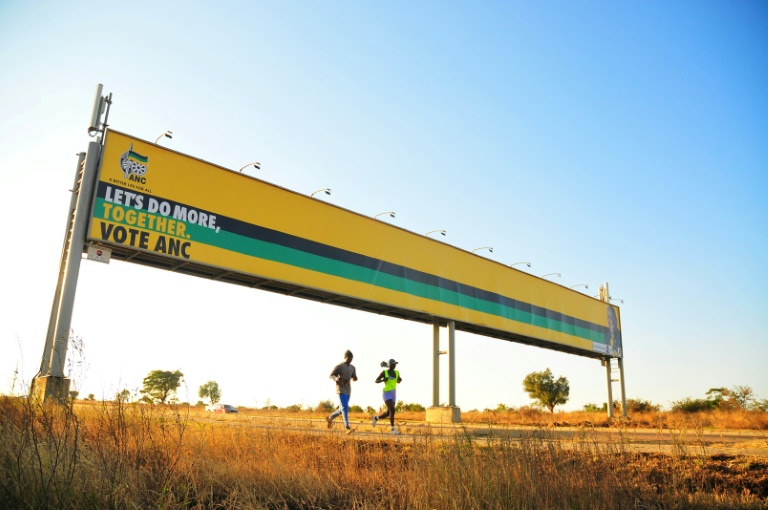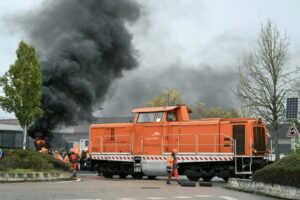Migration, infrastructure woes fuel S.Africa poll disinformation

After 30 years of South African democracy, the ruling ANC risks losing its absolute parliamentary majority for the first time – Copyright AFP Glenn CHAPMAN
Tendai DUBE with James OKONG’O in Nairobi
Propagandists and scammers are exploiting xenophobia and anger over failing infrastructure to unleash a wave of disinformation ahead of South Africa’s most contested polls since 1994, experts warn.
The ruling African National Congress (ANC) risks losing its outright majority in the May 29 ballot amid soaring unemployment, rising xenophobia, prolonged power blackouts and allegations of endemic corruption.
AFP Fact Check found social media awash with false claims linked to the high-stakes election.
They ranged from AI-generated images showing poor road conditions in the opposition-run city of Cape Town, to parties being accused of supplying illegal foreigners with fake papers.
“It’s very concerning that the levels of xenophobic discourse have risen in the last months as the elections have gotten closer,” said Dale McKinley of Kopanang Africa Against Xenophobia (KAAX), which is part of an international anti-racism network.
Prevalent themes include foreigners allegedly stealing jobs from locals, putting a strain on healthcare systems and being responsible for rampant crime.
“These are complete lies and misinformation but they spread and people then begin to think that they are true and all the stereotypes become greenlit in that context,” McKinley added.
-‘Immigrants as pawns’-
Despite having one of the world’s highest unemployment rates, South Africa attracts many economic migrants from elsewhere on the continent.
The influx, coupled with a dim economic outlook, has led to sporadic bursts of anti-immigrant violence in recent years.
Electoral candidates have further stoked the flames of online hate and disinformation by tapping into xenophobic sentiment and blaming foreigners for the nation’s problems.
“Candidates in South Africa’s forthcoming general elections have been scapegoating and demonising foreign nationals, risking stoking xenophobic violence,” Human Rights Watch warned in early May.
“Politicians are using immigrants as pawns, without regard for their safety in an attempt to score votes.”
Smaller right-wing outfits like ActionSA have repeatedly promoted false -– and vastly exaggerated –- numbers of illegal migrants in South Africa, as they seek to undermine the ANC-led government.
Meanwhile, online supporters of the xenophobic group Operation Dudula have claimed that the opposition Economic Freedom Fighters (EFF) had created fake identity papers for undocumented migrants so it could gain more voters. But the pictures used as proof were from an unrelated police raid.
AFP Fact Check has monitored numerous other social media users spreading xenophobic content, including an X account called “Put South Africa First” whose feed is littered with posts targeting Zimbabwean nationals.
“The expression of such sentiment can fuel animosity and potentially lead to disputes over election results, particularly in a closely contested race like the current one in South Africa,” said Cayley Clifford, the deputy editor of fact-checking organisation Africa Check.
– ‘Digitally driven’ poll –
South Africa’s poor public service delivery is another hot-button issue for many of the more than 27 million registered voters.
The continent’s most industrialised economy grapples with decaying infrastructure, from rail and roads to ports and power stations.
As a result, the nation’s 62 million inhabitants regularly face water outages and prolonged electricity blackouts.
This crisis, worsened by a series of successive graft scandals, has become a thorn in the side of the ANC, which has been in power since the advent of democracy ended white-minority rule in 1994.
The crisis has also provided fodder for disinformation as social media users seek to boost or discredit the leading party’s track record.
“This kind of misinformation misleads the public and creates a false perception of a politician’s or party’s accomplishments,” Africa Check’s Clifford said.
AFP Fact Check debunked a Facebook post shared thousands of times that falsely accused the ANC of failing to complete a public toilet project.
Another photo circulating on platforms allegedly showed massive potholes in Cape Town, which is governed by the opposition Democratic Alliance (DA).
Analysis showed the image had been created with an artificial intelligence tool.
For political analyst William Gumede, the “exaggeration of achievements and the underplaying of the complexity of problems” play key roles in what he termed South Africa’s most “digitally driven election”.
“There used to be forums and debates where policies were discussed, that’s not happening anymore except at a very narrow level. It is now being replaced by the digital sphere,” he told AFP.
“Digital disinformation becomes factual in mainstream debates and policy making and the pronouncements of politicians and in manifestos.”
Migration, infrastructure woes fuel S.Africa poll disinformation
#Migration #infrastructure #woes #fuel #SAfrica #poll #disinformation





